
..........................................................................................................................................................................................................
wheel meet again...

my appreciation of all things bicycle was pretty much led by richard's bicycle book, a paperback held in great esteem and composed, compiled and authored by the late great richard ballantine. it's the book i wish i had read before i bought my first ten-speed racer, because i managed to get all ten of those gears completely wrong. if you plan to tour the world (i could have if i'd wanted to), 42/52 with trouser guard married to a freewheel with only a 21 big sprocket was definitely not the ideal setup.
however, midst all the exciting possibilities offered in each chapter, there were one or two scary bits too, particularly in the sections dealing with the often intricate mechanical niceties. for instance, though i do not have my copy easily to hand, i recall mr ballantine warning the unwary that, in the days of cup and cone bottom brackets, removing either of those cups was likely to result in a flurry of quarter-inch bearings decorating the floor. this accompanied by the likelihood of several making their way underneath stuff they should not be found underneath.
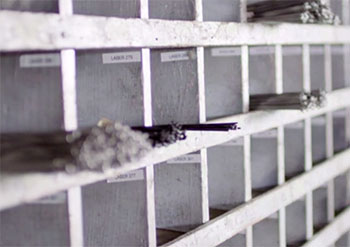
not entirely comprehending that of which he wrote, i left any form of bottom bracket maintenance till the very last.
however, contemporary assembly techniques of the day meant that the prospect of those loose bearings was lessened by the imposition of bearing races. fewer bearings i'll admit, but now not only allegedly simpler to assemble in the factory, but ultimately simpler for the ham-fisted home mechanic. this was certainly my first introduction to the necessities of mass production.
nowadays there are all sorts of aspects of the bicycle that bear the marks of the far east and a means of putting everything together more easily. nowhere is this more marked than in the field of factory-built wheels. though the genre may have begun elsewhere, the most obvious progenitor of the factory-build was mavic's ksyrium. while the french firm had previously offered complete wheels of a classics mold, featuring their own cartridge bearing hubs laced three-cross to a sturdy pair of mavic rims with regular double-butted stainless steel spokes. ksyrium changed all that; a competitive wheel that could be machine built.
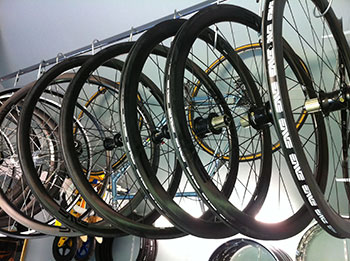
featuring flat and straight zircal spokes affixed to the profiled rim via a proprietary, serrated nipple, the inside of the rim was effectively sealed. the construction methods were designed to allow for machine assembly and initial truing, and the concept proved remarkably popular, fostering a whole slew of me too products. nowadays it's possible to acquire factory-built wheels of pretty much every flavour, frequently featuring lashings of carbon fibre. it is, as they say, the modern way.
but while all this was going on, with professional riders regularly seen aboard the latest from someone's factory line, what happened to the handbuilt wheel, once the mainstay of the upper echelons of cycle racing and touring? had the nation's wheelbuilders simply folded up their truing stands, thrown away the wheel disher and pocketed their spoke keys?
derek mclay occupies his daily hours hand-building wheels under the banner of wheelsmith in larbert, scotland, near stirling. meanwhile, jude gerace of sugar wheelworks, builds superlative wheels in portland, oregon, so it seemd pertinent to ask them both whether there was still room in the modern world of cycling for the handbuilt wheel?

"In terms of volume" said derek, "and compared to the percentage of cyclists owning handbuilts years ago, it might seem like a dying art. however, the more people ride their bikes, the more they often realise the wheels fitted to their bikes aren't up to their demands."
jude concurs but perhaps for different reasons. "We've noticed an increase in hand-built wheels particularly when we have to deliver the unfortunate news that a repair is not possible because a part is no longer made. It's not just the economic quandary of a new set, but now what happens to the rest of the wheel when a small part is missing?
"I think more than ever there is room for hand-built wheels and the connected values they have with them: they're sustainable, they're repairable, and the performance is in line with an individual rider's needs, versus a 'one size fits all' solution."
take a look through any of the online cycle sales channels, and you'll find more factory-built wheels to choose from than you could ever imagine. granted, many of them seem like the same wheel but with different graphics on the rim, making it even harder to make a prudent choice within your budget. and you needn't consider contacting the manufacturer to ask if perhaps you could have a couple of spokes fewer on the front, or a rim that's a couple of millimetres shallower than that advertised. that is not the way it works. for that sort of customisation, you'd need a wheelbuilder.
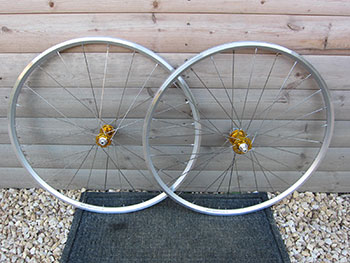
but apart from price, why would i ask either derek or jude to build me a pair of wheels rather than make my choice from the catalogues?
"At Sugar, what you get is a small shop that cares. A shop that knows the vendors and can advocate for you and that cares about you even after you've finalized a sale. Many companies stop caring when the product leaves the factory."
"According to Derek "The main thing is, they will perform and feel a lot better. That comes from choosing the right number of spokes for the rim and the type of spoke, using hubs that are designed to operate as hubs, and not make a design statement or try to be different for the sake of it. One other thing is 'repairability'. We've given up with some factory wheel repairs due to the time required to fix them."
"When we get the balance right, and you are up to speed on a properly tensioned pair of hand-built wheels, there is that feeling that they were made just for you. Like a custom frame does."
in the face of this knowledge, and it's hardly a well-kept secret, you have to wonder why the factory option is so often chosen. granted, many of today's bicycles arrived with factory-built wheels straight from the shop floor. it would make less than economic sense to ship scottish or portland built wheels all the way to taiwan to fit at source. and to be honest, both jude and derek would struggle to supply the demand, even if they joined forces and worked all night. rather a lot of cyclists are more than happy with their shop purchase.
at least until they aren't.
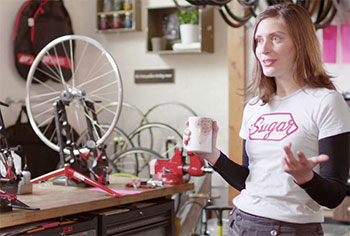
but could it be that the big boys such as mavic, campagnolo, zipp, fulcrum et al have the money to provide the professionals with their products. and seen on the international stage, there could surely be a case of 'if they've got it, i want it'.
derek figures that to some extent this is true. "Given the number of wheels a team gets through in the grand tours or even lower ranking professional use, it would be too costly and time consuming to get their wheels hand-built." some may say that this was hardly the case in eddy's day, when every team's wheels were hand-built. so what's changed? well, the teams are considerably larger nowadays thanks to the world tour, and there's no denying that it's a simpler logistic to ship out a few more factory wheels when needed. added to that, riders today have a wider choice of which wheels they have fitted to their bikes depending on terrain, weather, parcours etc. eddy just rode 32 three-cross for everything.
jude figures wanting to look like the pros is a large part of the equation. "But pro riders are just a small fraction of the number of people that ride bikes, however. There are a lot of really good riders that aren't sponsored that want a product that will work for them and have a long life."
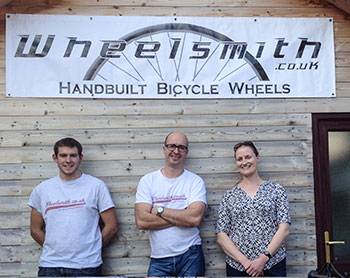
i made reference above to the preponderance of rotating carbon fibre nowadays, a feature that seems to go hand in hand with the increased number of factory-built wheels on the market. it would be naive to think wheels of this description are the sole preserve of the machines, but technically, is it possible for derek, jude or other skilled wheelbuilders to compete at the more exotic and carbon end of the equation?
jude says that sugar are working on that. "There are many ways we can have a slice of the pie. One way is knowing about these wheels so that we can offer repairs for when they need servicing. Another way is to offer aesthetic customization of our product line and thirdly, to exploit the values of a hand-built wheel, which is hard, but we're slowly making that happen."
derek has an outlook every bit as positive. "Yes. For example we use ENVE rims regularly and offer a few hub options that take the wheels into exotic territory. But the Taiwanese rims are nearly as good now, in all respects, so we can build something which is much more durable and just as light as that which would have been termed 'exotic' a few years ago."
however, he holds a healthy attitude towards such exotica. "Some of the exotic low-volume hubs and rims on the market don't actually work for very long and that's difficult to get over to someone who expects everything to last longer if they paid more money for it. There is a threshold, and it becomes disappointing for them when we refuse to build that way."

in the heyday of richard's bicycle book, aside from the cheap steel rims laced with galvanised steel spokes, the cycling world revolved on carefully hand-built wheels. granted they may not have been specifically matched to the rider, but their resilience, repairability and ease of acquiring spare parts made them ubiquitous, popular and effective. things have changed somewhat since then. can the handbuilt wheel regain its lost market?
The market has always been there, but if the market is always 'I want it because the pros have it' then no." says derek. "For the majority of riders who ride a few sportives a year and a few thousand miles, cheap factory wheels will get them round if they maintain them. It's the 'don't fix what isn't broken' thing. But when they do break, or if you want something that can be really enjoyed for what it is and get the best out of your bike, a pair of hand-built wheels will do the job better for longer."
jude sees things slightly differently. "Our shop has never been as busy, so i might have a different perspective; i'm not sure. I'm in it to win it and will always do my very best to give hand-built wheels a 'voice' in this industry. Maybe we'll eke out a good living or maybe we'll be faced with the inevitable truth of having to close our doors. But one thing I know is that it's well worth the effort of advocating hand-built wheels."
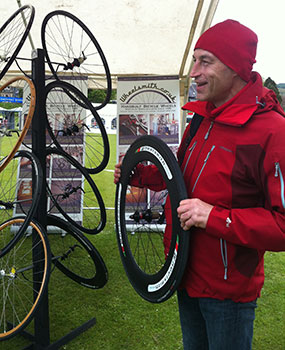
for derek, probably echoing similar sentiments from jude "It is rewarding for us to see a pair of wheels going to someone we know will look after and enjoy them for years to come, maybe take them on holiday a few times, or win a few races. It's the feedback we get from these people keeps us going."
but then there's the learning curve that comes with aspiring to a pair of hand-built wheels from a local builder (or in my case, probably the one that's closest. though both the interweb and fedex often mean sugar wheelworks is every bit as close as wheelsmith.) unlike the prescribed components that form the factory-build, there are an inordinate number of hubs, spokes, rims with seemingly endless combinations and possibilities available to the inquisitor. if you are less than well-versed in the art of the bicycle wheel, where do you start? should you ask endless questions of your appointed builder? after all, how else will you learn?
while there is a degree of reality involved in that of which we discuss, all the foregoing can occupy so much time and prevarication, that after a month or so, you might feasibly find yourself no nearer to that ideal pair of wheels you could have already been riding if only you'd placed your faith and trust in the wheelbuilder in the first place.
"Yes. There's got to be a high degree of trust involved and it's imperative that the customer gets the pre-order and back-up service they deserve." says derek.
 "My output is becoming severely limited by the amount of time I spend answering emailed requests for information. The intangibility of an 'internet' workshop without any perceived queue seems to invite people to ask as many questions as they possibly can, especially when they always get an answer, even if it's not related to our wheels. If someone did this in a small shop where the manager served them, they'd get booted out. I canŐt think of another market in which this happens to the same extent. If you were to quiz a waiter on the minutiae of the menu or how it might taste, you'd end up really hungry".
"My output is becoming severely limited by the amount of time I spend answering emailed requests for information. The intangibility of an 'internet' workshop without any perceived queue seems to invite people to ask as many questions as they possibly can, especially when they always get an answer, even if it's not related to our wheels. If someone did this in a small shop where the manager served them, they'd get booted out. I canŐt think of another market in which this happens to the same extent. If you were to quiz a waiter on the minutiae of the menu or how it might taste, you'd end up really hungry".
it seems this 'problem' is one that traverses the atlantic ocean, for similar woes are experienced at sugar. "I experience something of a similar conundrum. This is made more frustrating after a lot of time and effort answering questions, to be then informed that they'll have their wheels built by someone charging less. My other issue is of people using our design services then purchasing parts elsewhere at a modest discount. We love sharing knowledge but without a way to monetize our time and research that goes into what we do it often leaves us frustrated.
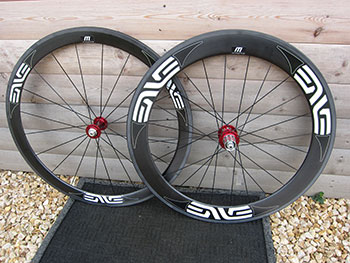 "I love what I do, but the amount of time wasted by people who want to 'pick my brain' (which is quite literally what people say when they come into the shop) has taken a lot of effort not to get jaded. It's like going to a restaurant with your own vegetables and asking the chef to work his magic while expecting a discount."
"I love what I do, but the amount of time wasted by people who want to 'pick my brain' (which is quite literally what people say when they come into the shop) has taken a lot of effort not to get jaded. It's like going to a restaurant with your own vegetables and asking the chef to work his magic while expecting a discount."
i have not composed this feature to allow two highly skilled wheelbuilders to have a public moan. there is little doubt that the factory built wheel has encroached on the territory once held as sacrosanct by the devotees of the truing stand. for many, they fulfil a need and do so perfectly adequately, but zipp's recent recall of a particular model of front wheel with the words ..."could incur retaining ring failure that might result in an ejection of all the wheel's spokes. This may result in wheel failure." hardly encourages wholesale adoption by the wary. particularly since their method of spoke retention is common across the genre.
so why did i give vent to the above? it's still my contention that there is little in this world that can equal a pair of wheels hand built by a builder who not only understands you and your style of riding but possesses the skills to fulfil those needs. and if you fear that the big boys are in a better position to carry out desirable research and development, i think it prudent to offer jude gerace the last word.
"We continue to expand our knowledge. Not only do we work with an engineer, we're also working with a metallurgist!"Ęanyone in any profession who can remain curious about their work is, i believe, someone worth supporting.
wheelsmith, scotland | sugar wheelworks, portland
thursday 26 february 2015
 ..........................................................................................................................................................................................................
..........................................................................................................................................................................................................